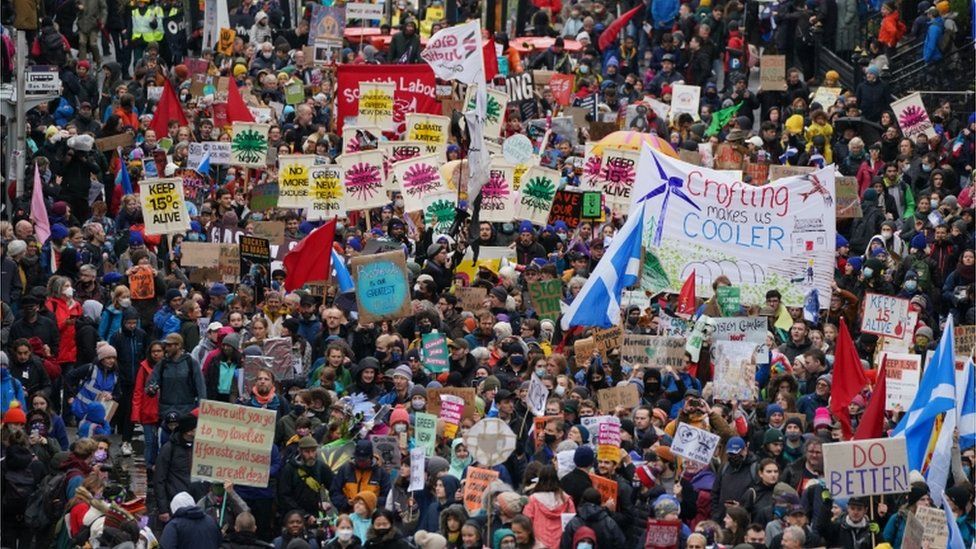
From Madrid to Glasgow: On the way to implement the Paris Agreement
Author: Djego Abedinaj
Since 1995 when the first Conference of Parties (COP) was held in Berlin, the road from Madrid to Glasgow has been longer than any other conference. Due to the COVID pandemic, the COP26 planned to be held in Glasgow was postponed ahead of 2020. After two years of dynamic political, social, and economic developments, all eyes and ears are on Glasgow.
The disruption of economic activity due to the pandemic significantly affected the increase of the carbon emissions in the post-COVID period, drawing attention to the effect of industry on climate change. On one hand, COVID led to an immediate need for countries to fully restart economic activity without paying attention to environmental effects. On the other hand, a deep crisis like COVID could serve as an opportunity to drive and accelerate innovation and structural changes.
At first glance, the COP26 agenda seems promising. It is comprehensive, designed to capture diverse topics; inclusive, including youth and women to enhance their role in advocating climate action, and innovative by coming up with some new proposals, for instance, the Clydebank Declaration. However, COP26 will take place in an unpredictable and complex economic and political moment when every country is seeking to have a full economic recovery after the pandemic closure and trying to remobilize its full economic potential.
Two years after the pause caused by the pandemic, under extraordinary rules during extraordinary times COP26 has gathered more enthusiasm and optimism to push forward the climate agenda. The decision of President Trump’s administration to withdraw from the Paris Agreement was considered a step back in terms of credibility and coherence on the way to build consensus, meet the climate targets and also advance on nationally determined contributions (NDCs). President Biden’s decision to rejoin the Paris Agreement has raised hope and optimism on making multilateral efforts on climate action effective and credible. He has pledged to be committed to multilateral action on climate change, and appointed John Kerry as Special Presidential Envoy for Climate. The return of the US back to the game is a reaffirmation to continue efforts on tackling climate change.
On the other side of the Atlantic, the political landscape seems to be more target-oriented. The EU has adopted the EU Green Deal, launched the Fit for 55, and in July 2021 adopted the Carbon Border Adjustment Mechanism (CBAM), a unilateral measure expected to enter into force by 2023. In principle, the EU CBAM is a tax on imported goods with high carbon intensity. The EU Commission aims to prevent carbon leakage and encourage developing countries to take action on green transition. However, the EU legislative package has been facing disapproval by several EU trade partners expected to be impacted the most by the CBAM. Countries like China or Russia are against the CBAM, considering it a protectionist measure that may impinge on global trade rules.
The launch of the Clydebank Declaration policy initiative is expected at COP26. The Clydebank Declaration is considered an opportunity to extend the coverage of the carbon taxation on other economic sectors. Concretely establishing “green corridors”-specific maritime routes decarbonized from end to end, including land-side infrastructure and vessels.
In addition, civil aviation is on the COP26 agenda as one of the sectors still considered a ‘free-polluter’. According to the EU Commission in 2017, civil aviation represented around 3.8% of the total global emissions. Including the sector into the carbon tax system has been consistently a battleground, especially by the most advanced economies. Despite the efforts made over previous rounds of negotiations, the proposal has faced strong opposition by the industry stakeholders considering the proposal as a “discriminatory burden”.
Taking further progressive steps on climate action requires massive financial sources to support the green transition. Climate finance has been recognized since the beginning for its huge importance in making progress real. However, climate action is not just about finance, it goes much further. The COVID pandemic had a significant impact on public debt, constraining countries’ ability to allocate funds on climate action, especially for developing countries. Even though public finances are at stake, allocation on green investment such as renewable energies, green transportation, and digital skills education might eventually be a driver towards green transition.
Establishing the new policy instruments to ground the Paris Agreement requires massive capacity in technical terms. But despite the technical complexity of implementing the new initiatives discussed above, extra efforts are necessary on the political level. Experience has shown that despite innovative proposals, promises, and soft measures, the advancement of the climate change agenda relies significantly on the political will of countries and their structural constraints on addressing the climate challenges. In the light of these challenges, COP26 represents a real opportunity to return optimism and trust on the way forward to ground the Paris Agreement and make it work for real.
To conclude, multilateral events such as COP26 should serve to share the burden and bridge interests on the way forward, to build consensus on the international level, and make sure that everyone is on board.
Short Bio
 Djego Abedinaj is completing a MA degree on European Studies at the University of Siena, Italy. He has been engaged as Intern at the Center for the Study of Political Change (CIRCaP) and formerly at the Corte dei Miracoli, an NGO focused on social and human rights. He has a BA degree in International Relations with a focus on international security, from the European University of Tirana, Albania. His research interests cover the European Union policies on climate change, trade, digitalization, international cooperation on climate change and technological governance.
Djego Abedinaj is completing a MA degree on European Studies at the University of Siena, Italy. He has been engaged as Intern at the Center for the Study of Political Change (CIRCaP) and formerly at the Corte dei Miracoli, an NGO focused on social and human rights. He has a BA degree in International Relations with a focus on international security, from the European University of Tirana, Albania. His research interests cover the European Union policies on climate change, trade, digitalization, international cooperation on climate change and technological governance.
Twitter https://twitter.com/abedinaj_diego
Linkedin https://www.linkedin.com/in/djego-abedinaj-8438a4185/
Bibliography
European Commission (2021) Regulation of the European Parliament and of the Council, establishing a Carbon Border Adjustment Mechanism.
Caldwell, M. & Alyza, N. (2020) What COVID19 tells us about making climate finance resielnt for the future crisis.
Green Climate Fund (2021) Scaling up climate finance in the context of the COVID19, Report.
IACO (2019) Trend in emission that effects Climate Change.
IAI (2020) Renewing Multilateralism for 21st Century, The Role of the United Nations and the European Union.
Iberdola, (2021) Countries most affected by Climate Change.
Singh, H & Bose, I. (2021) Shaping the Future of Multilateralism, Artificial Distinction between Climate Change Adoption and development restrictions access to climate finance for developing countries, Henrich Boll Stiftung.
Reuters, (2021) Russia says EU Carbon Border Tax may impinge global trade rules,
UK COP26 Presidency Programme.
Image Credits: https://www.bbc.co.uk/news/uk-scotland-59185007

0 Comments